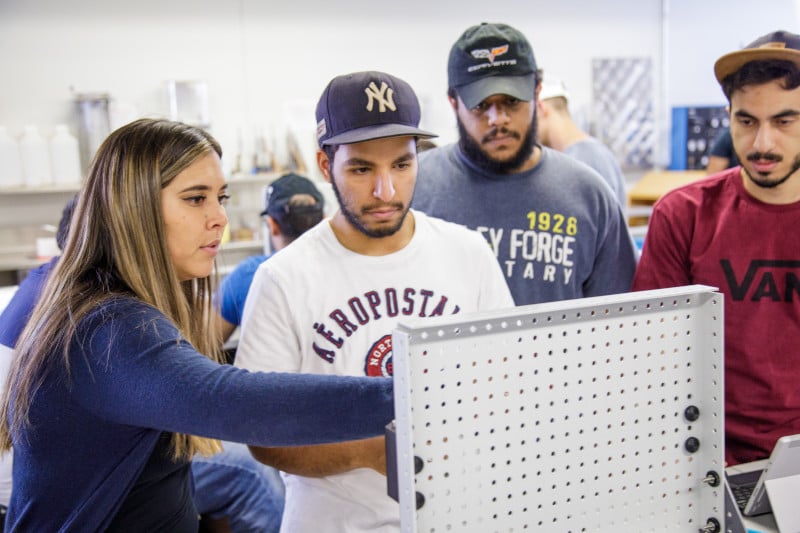Seeing a need for greater diversity in STEM industries, the College of Engineering, Informatics, and Applied Sciences (CEIAS) at Northern Arizona University made an epic decision.
With the creation of Equal Partners in Inclusive Community (EPIC), college leaders have a twofold focus: make CEIAS a welcoming place where students from underrepresented groups can thrive, and ensure that all students become accustomed to working with people of different genders, ethnicities and backgrounds.
This is especially critical now as the problems facing society grow increasingly complex, and solving them will require creativity, innovation and a broad talent pool pulled from a range of disciplines that will only be prepared by embracing diversity early.
“The lack of diversity in our engineering classrooms today will underpin the lack of diversity in the future engineering workforce,” said Fethiye “Faith” Ozis, a senior lecturer in civil and environmental engineering and the college’s inclusion fellow. “The research has concluded that if the U.S. fails to prepare citizens from all population groups to participate in the technology-driven economy, we risk losing our economic and intellectual preeminence.”
With student success as the first tenet of NAU’s mission, college leaders looked at retention in their department and found that in engineering disciplines, retaining students from underrepresented groups remains a particular challenge that requires individual outreach for each student. This is true at universities across the United States. To combat that at NAU, leaders set the goal of making inclusion part of the college’s culture.
The most effective way to increase retention, they found, was to establish programs that set out initiatives, made creating a respectful environment a priority and inviting all students, staff and faculty to contribute to the cultivation of diverse student retention. From there, Ozis and Interim Dean John Georgas created EPIC.
“We want our EPIC students to become change agents,” Ozis said. “We anticipate that EPIC initiatives will help retain more minority students in engineering fields, and as representation increases, it will be easier than ever to find role models for engineering students from various backgrounds, thus positively influencing students who may not feel they belong. CEIAS unites all students through EPIC by merging ideas, approaches and knowledge from widely diverse backgrounds and expertise to stimulate innovation and discovery.”
EPIC has a number of events and programs designed to get students thinking beyond what they study in the classroom:
- Mentoring: EPIC students can participate as a mentor or a mentee. Students are encouraged to become mentors once they graduate from their programs.
- Speaker series: The EPIC Speaker series brings role models, either from academia or the workforce, who represent diverse and underrepresented backgrounds to speak to students about achieving their full potential in the workforce. Additionally, EPIC seminars will touch on career development, the challenges of the workplace with solutions and projects and research speakers produced. Lastly, EPIC speakers will share their experience and insight about working in the real world, info that they wish someone had passed along when they were in college. The goal of the series is to motivate and inspire all CEIAS students by defying stereotypes and help them build their network and future opportunities.
- EPIC FAIL: Did you know failure is a critical part of success? Several NAU departments host an annual open mic night to allow students to share times things haven’t worked out quite the way they wanted and understand the true meaning of FAIL: First Attempt in Learning.
- Open Dialogue: Also known as the Collective, this inclusion initiative will be launched in the fall and is aimed at helping faculty and staff see their own blind spots and cultivate understanding, compassion and open-mindedness to experiences that are different from their own. It is dedicated to creating positive cultural change around equity, inclusion and justice in higher education and STEM in general. The Collective is predicated on a paradigm shift, which moves away from lip service to the idea of diversity and helps participants become leaders on these issues. This Collective is designed to have participants continue the conversation about the lack of diversity, the lack of inclusion and the barriers that face women and underrepresented minorities in the applied sciences and engineering.
“Mutual respect and inclusiveness are core aspects of our institution and are key to broadening access and opportunity for our students,” Georgas said. “I’m really proud of our work with EPIC, and accomplishing so much in a such a short time is a testament to the dedication, hard work and passion of our faculty and students.”
EPIC is a new effort, but leaders are confident that a concerted, college-wide effort can help CEIAS become and remain a place that values diversity of groups and ideas, which not only will help more students be successful in school but will aid all students as they prepare for their post-college careers.
“Diversity is highly critical to what we are trying to achieve as engineers,” Ozis said. “It’s about being successful at solving not only today’s but also the future’s problems in the most effective manner. Diverse teams are better teams: they function based on mutual respect, are more efficient and creative in solving the kinds of complex problems.”
For more information or to get involved, visit EPIC’s website.
Heidi Toth | NAU Communications
(928) 523-8737 | heidi.toth@nau.edu




